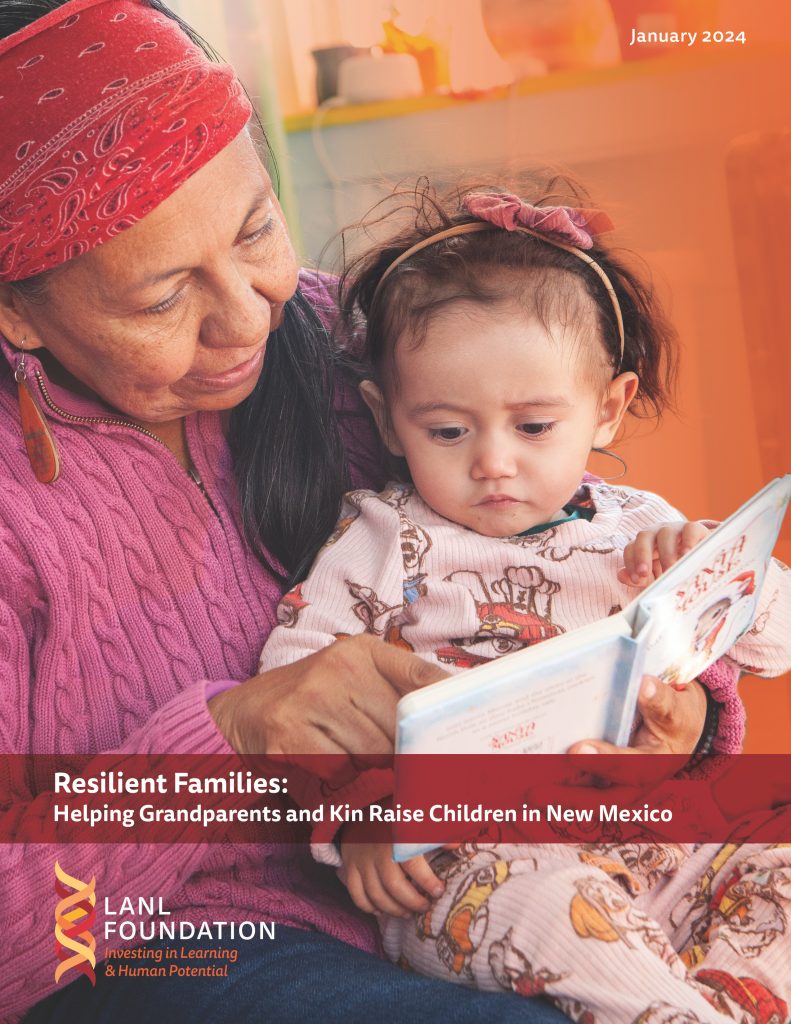“Resilient Families: Helping Grandparents and Kin Raise Children in New Mexico” details the growth and specific needs of kinship families in the state and making recommendations for how these families can be better supported.
Grandparents and kin play an increasingly important role in raising children in New Mexico. From 2017 to 2023, the number of children in kinship care (where grandparents or kin raise children) rose from 30,000 to 36,000, an increase of 20 percent. This is likely an undercount, however, since many families rely on informal arrangements. By some census estimates, as many as 55 children are being informally raised by kin for every one child being raised by kin through the state’s foster care program.
“Kinship care is not unique to New Mexico, but the number of kinship families is growing here while it is decreasing nationally,” said Catherine Dry, one of the report’s authors and an independent consultant to LANL Foundation. “Our report sheds light on both the pivotal role grandparents and kin play in providing much needed stability and better outcomes for children, but also the challenges they face, including emotional, mental, physical, and financial strains.”
One grandparent raising her grandchildren, who was quoted in the report, said: “My day consist[s] of jumping out of bed, starting breakfast, getting kids up and dressed. Kids are then fed, hair and teeth brushed. Jump in the car, drop one at school at 8am and the twins at 9. Hurry home, start laundry and wash dishes and pick up. At 1:30pm return to school to pick up the 5-year-olds. Get home, make lunch and do any required schoolwork and more household chores. At 3:30 pick up 7-year-old, fix snacks, do homework, start dinner. A short bit of playtime then dinner and dishes. Then it is bath and bedtime…By the way, I am 70 and a disabled vet, and a widow.”
The report identifies five key layers of support that kinship families need to thrive. Families need legal assistance to help navigate interaction with the courts and, in some cases, to obtain legal parental rights. Families need financial assistance as kinship families are often low-income. Providing a monthly stipend to grandparents or kin raising children equal to that offered to foster families might cost an estimated $6,000 per year per family, a cost far less than the estimated $21,000 for a single foster care placement. Accessible and available behavioral healthcare and respite care are needed as kinship caregivers often struggle to navigate trauma, grief, anger, and guilt. Coordinated state support systems are also needed. While the state offers many public benefits – such as cash, food, and healthcare assistance – navigating various program eligibility and enrollment requirements is complex.
“In New Mexico, grandparents and kin are playing critical roles in improving outcomes for some of our most vulnerable children,” said Kersti Tyson, Director of Research and Evaluation at LANL Foundation and one of the report’s authors. “Supporting their success with a more comprehensive and coordinated response is a vital necessity for our state.”
The report makes a series of recommendations on how to improve outreach and engagement with kinship families, as well as how to increase services for them. Among the outreach recommendations are increasing appropriations to increase access to kinship navigator programs and ensuring case workers at the New Mexico Human Services Department consistently receive training on the eligibility of kinship families for benefits. Also, the state should ensure grandparents, kin, parents, and the organizations that serve them are part of discussions on how to allocate the opioid settlement funds in systematic ways that address root causes, prevention, and improve family outcomes. Recommendations for increasing services include appropriating funds to provide monthly stipends to grandparents and kin that are primary caregivers, and for legal assistance to these families.

